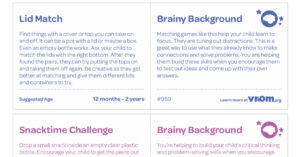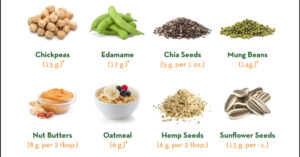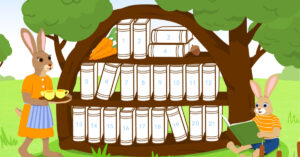Partner Resources
Science in Everyday Moments
Young children are curious about the world around them. Through the everyday moments you already share, you’re helping your child learn like a scientist. Our partners at Vroom have some brain builders to help you turn nature into a classroom!
Read MoreCulinary Basics: Knife Skills
Ensuring maximum safety in the kitchen is crucial, and following basic knife guidelines is essential for everyone’s well-being. Once knife safety is mastered, this essential skill can lead to an increase in scratch preparation. Our partners at the Institute of Child Nutrition outline the importance of knife safety, skills, maintenance, and storage.
Read MoreQuick Guide to Plant-Based Proteins
Despite the common misconception, you don’t need to rely on meat, dairy, eggs, or other animal products to reach your daily protein goals. Beans, lentils, tofu, whole grains, nuts, seeds, and meat alternatives all contain protein, and these ingredients can often be used in place of chicken, beef, pork, or fish in recipes. Eating a combination of these plant-based ingredients ensures a balanced intake of protein, fiber, and other essential vitamins, minerals, and nutrients.
Read MoreAutism Acceptance Month
April is Autism Acceptance Month! Our partners at Sesame Street in Communities have created new bilingual (English and Spanish) resources to help foster autistic children’s sense of creativity as well as support parents and providers in helping discover and support children’s unique perspective and personality.
Read MorePromoting Healthy Sleep Habits
As early childhood experts, you understand that sleep is not just rest—it’s foundational for healthy development in young children, and it affects everything from brain growth to emotional regulation and physical health. Well-rested children are better able to learn, concentrate, and manage their emotions which are all important for school readiness. Our partners at Child Care Aware of America have some tips to make sure those in your care are well-rested. Plus, find resources from our partners at AAP and Sesame Street in Communities!
Read MoreEarth Day Toolkit
Earth Day is on April 22nd! Celebrating Earth Day is a fun way to connect participants to their food and the environment, while encouraging them to try new things and get the nutrients their bodies need! There are a variety of ways to increase education and engagement and the Humane World for Animals has drawn up a list of suggestions for festivities surrounding Earth Day/Week/Month.
Read MoreCACFP Outreach
If you are a child care operator currently participating in the CACFP, congratulations! Your commitment to serving nutritious meals and snacks is crucial in fostering healthy behaviors in young children. This Mealtime Memo from our partners at the Institute of Child Nutrition highlights the benefits of the CACFP for operators, children, and families.
Read MoreLeap into Learning: Read Aloud Challenge
How often do you read aloud to the children in your care? Reading aloud to young children, particularly in an engaging manner, promotes emerging literacy and language development and supports the relationship between child and parent/caregiver.
Read MoreMovement for Healthy Bodies
Physical skills and healthy bodies can be built through everyday activities and movement. As a caring grown-up in a child’s life, you can facilitate movement and learning, and our partners at Sesame Street are here to help. Their worksheet provides fun ideas to get kids moving. Remember, there’s always an opportunity to move!
Read MoreNutrition Basics: Fiber
You may know that fiber is important, but do you understand why or how much you need? This Mealtime Memo from our partners at the Institute of Child Nutrition covers fiber sources, health benefits, and strategies to increase fiber intake.
Read More









